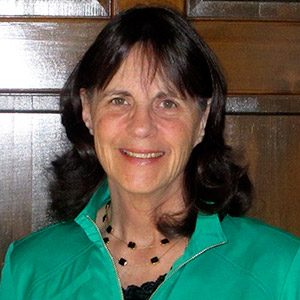
Maggie Pike
The SDSU Writers’ Conference has a long history of launching careers by opening doors. This annual conference was among the first to pioneer 1:1 appointments with agents and editors, giving writers unprecedented access to top-tier publishing professionals — many of whom interact with unpublished authors only through conferences.
Among the more than 300 writing enthusiasts/aspiring authors who descended upon the 2015 SDSU Writers’ Conference was Maggie Pike, who came in search of feedback on her collection of creative nonfiction stories, Just Listen for the Thud. Among her scheduled appointments was an Advance Reading with Jill Marsal, founder of Marsal Lyon Literary Agency.
Advance Reading appointments require submitting the first 10 pages of your manuscript to be read prior to the conference. Attendees also have the option of scheduling a Consultation appointment, which is a Q&A opportunity to pitch your project as a whole and discuss its viability in the marketplace.
Every year, each editor and agent chooses their favorite project(s) for a Conference Choice Award, and Pike’s was chosen by Marsal. We trace Pike’s SDSU Writers’ Conference experience, and where she is today on her journey to publication.
As you a writer by profession or is it an avocation?
It’s an avocation. I’ve written seven books, four published traditionally and three self-published. I write a blog for fun (maggiemccannpike.com), and I’ve published several articles for magazines as well as guest commentaries for Denver’s newspaper, the Denver Post. But I support myself in ways other than writing, so it’s an avocation.
What is Just Listen for the Thud about?
It’s a collection of stories about family members who use humor to care for their loved ones who are suffering serious illness.
It differs from most caregiving books in three ways: 1) It focuses on light-heartedness, not challenge. 2) The how-to of caregiving is woven into the caregivers’ narratives. 3) It’s not about illness as tragedy, nor about caregivers as victims. Instead, the illness is the backdrop for the heart of the book, namely a compelling testimony to the depth of love, the endurance of commitment, the healing force of human connection, salient personal growth in the caregiver, the intimacy that develops between caregiver and care receiver — and, most importantly, the groundbreaking discovery that took them all by surprise: As caregivers, they have the power to heal the spirit through laughter.
How long have you been working on it?
It’s been two years.
Care to share the opening line or paragraph?
Light shimmers on trembling autumn leaves as the wind ushers in a change that will eclipse the sun. Inside, protected from the coming tempest, the room is quaking with laughter in the face of a different kind of storm.
Newcomers giggle nervously. Can I laugh? Should I laugh?
More confident laughter erupts from those who have learned they’d better, lest the disease they face every day consume them.
Ruth is talking.
“… and there we were, another fall, both of us this time. I mean, Jim’s a hundred pounds heavier than I am. So down we went. Our butts were stuck in the wastebasket, and our four legs were sticking out like cinnamon sticks in a bowl of chocolate mousse.”
Thunderous laughter.
These are caregivers in a support group—spouses, partners, children, and siblings committed to sharing the journey of their loved ones who have life-threatening illnesses. It‘s the one place they can laugh. For now, they’re cradled in the womb of people who understand.
Could you tell that Jill was pretty excited about your 10 pages or was it a complete surprise when you heard your name announced as a Conference Choice winner?
Jill was very complimentary about my writing and generous in suggesting what would make the book stronger. She was also realistic about the difficulties in getting such a book published. So it never occurred to me — not even for a second — that it was award worthy. In fact, I left the conference Sunday morning to return to Denver, so I didn’t attend the awards presentation. It wasn’t until three weeks later that I received the certificate in the mail. I didn’t even open it right away because I thought it must just be a certificate of attendance. When I read it, my knees started shaking and I felt like I was in The Twilight Zone. This couldn’t have happened; this couldn’t be me, I thought.
Are you still heady with euphoria?
I’m still very happy and proud that I received the award, but the twilight-zone feeling has lifted.
Did Jill give you any suggestions on reworking the first 10 pages before sending her the complete manuscript?
Yes, she did. Very astute ones, in fact. I did what she suggested, and it made a better book.
What was her response to your complete manuscript?
She cited the strengths and affirmed the need for such a book, but regretted that she wouldn’t be able to sell the book to the publishers with which she works. She gave two reasons: 1) You don’t present a revolutionary new way of caregiving. 2) Your platform is not large enough. She suggested self-publishing and writing articles on my subject.
How did you hear about the SDSU Writers’ Conference?
I was Googling writers’ conferences and wanted to choose one of the first of 2015.
Was 2015 your first time at the conference or have you attended before?
My first time.
What do you think is one of the greatest strengths of the conference?
The beautiful location, San Diego, and the magnificent venue. The variety and relevance of the workshops. Agent Jill Marsal — she was absolutely lovely; I would have loved to work with her.
Did you take advantage of the conference’s On-the-Spot Query Letter Critique session on Friday? If so, did you get constructive feedback?
Yes! I learned that I had received some poor advice previously — or that I had misinterpreted the advice — and ended up having to start from scratch. But I learned how to do it!
What’s the first book that spoke to you as a young reader?
I read every biography in the library. I connected with characters far more than with plot, so I immersed myself in their lives and linked my heart to theirs as surely as the people-person I still am today.
Who’s your favorite author (or top three if it’s hard to choose one)?
I love Anne Lamott for her humanness, which she’s able to transmit so well in her writing. And Pat Conroy for his luscious descriptions. And Alexander McCall Smith! He’s really one who “makes me tickle inside,” as does Lemony Snicket.
What keeps you going in the pursuit of your writing goal?
I spent a number of months reworking my manuscript and working hard to find an agent, and then a significant health issue took over my life, to which I must direct my energy. So now I’m on the path of self-publishing this particular work. But I will always write. I’m a writer, and that’s what I do!




